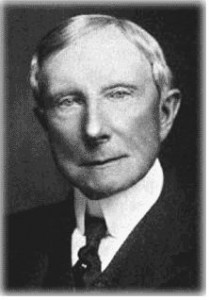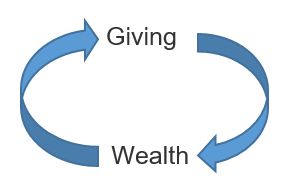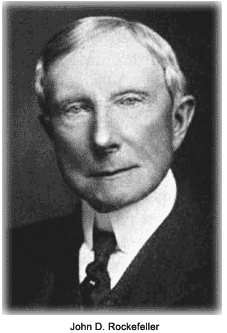Did you know there is one thing you can do that has been scientifically proven to:
- lower your levels of stress
- make you more productive and more successful, and
- make you happier, healthier and more prosperous?
It’s a simple thing as well.
It’s giving.
Giving of your money, your time, or even giving blood.
Of course, most of us don’t give because of the benefits we gain, but because we genuinely want to help other people.
My post today mainly comes from Arthur C. Brooks’ work, who is one of the leading researchers on charitable giving in the United States.
 Brooks came across a statement from John D. Rockefeller where Rockefeller stated that he was rich because he gave so much, and he believed if he stopped giving that God would take his money away from him.
Brooks came across a statement from John D. Rockefeller where Rockefeller stated that he was rich because he gave so much, and he believed if he stopped giving that God would take his money away from him.
Rockefeller was very wealthy.
His net worth was about $340 billion, and during his lifetime he gave away about $540 million.
He came across statements from a number of other wealthy people who basically said the same thing.
This bothered Brooks so he set out to prove that Rockefeller and others were wrong. Brooks says, “…what I found was that Rockefeller was right and I was wrong [1].” You can read the article referenced below to get into the details of the studies that he did, but what I want to look at here is the results of his studies.
Here are some things that Brooks discovered:
- Prosperity – when people give they prosper
- This is true whether you are giving of your time, money or even giving blood.
- If you take two identical families except that one family gives $100 more to charity than the other family, the giving family will earn on average $375 more in income than the non-giving family, and that $375 is statistically attributable to the $100 gift.
- As people and our country gets richer, they give more away, but as we give more away it translates into better economic growth for the country and the individual – it’s a wonderful cycle – the more you give the wealthier you become, which allows you to give more, which leads to more prosperity and on and on.

- Happiness & stress reduction
- People who give are happier than those who do not give
- People who give money are 43% more likely than people who don’t give to say they are very happy people.
- People who give blood are twice as likely to say they are very happy people than those who don’t give blood.
- When people give, it lowers their levels of stress which makes them more productive and more successful at work.
- One study showed that those who gave cut their stress hormones in half.
- People who give are happier than those who do not give
Let me share a story with you that illustrates at least one aspect of this. When I was younger – probably about 10 years old, there was a big snowstorm that left a fair amount of snow in our neighborhood. There was an older widow who lived on the corner, and my older brother and I and a friend from across the street decided we would shovel her driveway, but we were going to do it quietly so she wouldn’t know who did it.
Well, you can imagine how quietly three boys that age can shovel a driveway, but we did try! Every time she would peek out her window we would throw our shovels down and dive behind a bank of snow, figuring we were so fast she wouldn’t be able to see us. I remember going home feeling tired from shoveling, but also feeling really happy. Happy that we had pulled off this great feat of both strength and stealth, but happier because we had done something for her that she wasn’t physically capable of doing for herself. To this day I still feel happy when I think about it. We were definitely the main beneficiaries of this.
 We did find out later that we weren’t quite as stealthy as we thought when she brought us some cookies, so not only did we get the benefit of feeling happy, but some nice warm cookies as well. =)
We did find out later that we weren’t quite as stealthy as we thought when she brought us some cookies, so not only did we get the benefit of feeling happy, but some nice warm cookies as well. =)
I’m sure you have similar experiences – perhaps you have volunteered at a Food Bank, or a homeless shelter, or coached a little league team or done countless other acts of service as so many Americans do, and you felt the same way I did – giving of your time makes you happier.
I find the same is true of money. The very first thing on our budget line is the 10% we give to our church [2]. We never miss this money. Giving doesn’t make you poorer.
Brooks says, “What I charge you with today is what I charge myself with, which is to discover more creative solutions to working these concepts into our everyday lives.” Remember that you are the main beneficiary of your giving – it will lower your levels of stress, make you more productive and more successful, and make you happier, healthier and more prosperous. Just like Brooks I encourage you and me to examine our giving to see where we can do better.
 [1] http://speeches.byu.edu/?act=viewitem&id=1826 Note: This speech was given at Brigham Young University in 2009. Brooks, a Roman Catholic, talks about Mormon giving in this article but also deals with giving in general. You can also read Brooks’ book: Who Really Cares (http://www.amazon.com/Who-Really-Cares-Compassionate-Conservatism-ebook/dp/B004VRP37S/ref=sr_1_1?ie=UTF8&qid=1396546413&sr=8-1&keywords=who+really+cares+brooks) which deals with the subject matter without getting into the specifics of Mormon giving. The article is a great synopsis of the book, though, regardless of your religious affiliation or non-affiliation.
[1] http://speeches.byu.edu/?act=viewitem&id=1826 Note: This speech was given at Brigham Young University in 2009. Brooks, a Roman Catholic, talks about Mormon giving in this article but also deals with giving in general. You can also read Brooks’ book: Who Really Cares (http://www.amazon.com/Who-Really-Cares-Compassionate-Conservatism-ebook/dp/B004VRP37S/ref=sr_1_1?ie=UTF8&qid=1396546413&sr=8-1&keywords=who+really+cares+brooks) which deals with the subject matter without getting into the specifics of Mormon giving. The article is a great synopsis of the book, though, regardless of your religious affiliation or non-affiliation.
[2] Brooks found that of those who practice a faith (attend church weekly), 91% give to charity each year, compared to 66% of those who don’t attend weekly. Practicing faith is the number one predictor of giving. Malachi, in the Bible, says essentially the same thing Brooks is saying: “Bring all the tithes into the storehouse, that there may be meat in mine house, and prove me now herewith, saith the Lord of hosts, if I will not open you the windows of heaven, and pour you out a blessing, that there shall not be room enough to receive it” (Malachi 3:8-10). Giving brings us a myriad of blessings, as Brooks has pointed out, but you certainly don’t have to be religious to give!


[…] The authors cite three studies that show that spending money on yourself may temporarily make you feel good, but after time that good feeling fades. While spending money on yourself does not boost wellbeing, spending money on others does. When we help others out we feel good, even if it is just a little bit of money. For more detail on this subject, see “Why Giving Matters” (http://blog.ryanhlaw.com/why-giving-matters/). […]